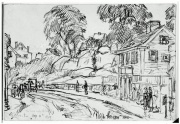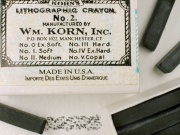Difference between revisions of "Lithograph crayon"
(Undo revision 28074 by Contributions/ ([[User talk:|talk]])) |
|||
| (2 intermediate revisions by one other user not shown) | |||
| Line 2: | Line 2: | ||
== Description == | == Description == | ||
| − | A type of grease pencil used to draw an image on a flat surface for reproduction by the lithographic technique. The crayon lines attract and hold an oily ink used in the printing process. Litho crayons contain [ | + | A type of grease pencil used to draw an image on a flat surface for reproduction by the lithographic technique. The crayon lines attract and hold an oily ink used in the printing process. Litho crayons contain [[tallow|tallow]] or [[stearic acid|stearic acid]], [[wax|wax]] ([[carnauba wax|carnauba]], [[beeswax|beeswax]]), resin ([[copal|copal]], [[shellac|shellac]]), and [[lampblack|lampblack]]. They also contain an alkali, such as [[lye|lye]] or [[potassium carbonate|potassium carbonate]], to saponify the fatty acids. The ingredients are mixed, heated then cast into sticks for crayons or thin rods for pencils. They are available in varying hardness: five for the pencil type and seven for the crayon type. |
| − | See also [ | + | See also [[tusche|tusche]]. |
[[File:lithog.crayon_gen.jpg|thumb|Lithograph crayon]] | [[File:lithog.crayon_gen.jpg|thumb|Lithograph crayon]] | ||
| Line 23: | Line 23: | ||
M.Holben Ellis, M.Brigitte Yeh,"Categories of Wax-based Drawing Media" WAAC Newsletter, Vol 19(3), 1997. | M.Holben Ellis, M.Brigitte Yeh,"Categories of Wax-based Drawing Media" WAAC Newsletter, Vol 19(3), 1997. | ||
| − | == | + | == Sources Checked for Data in Record == |
| − | * | + | * Ralph Mayer, ''A Dictionary of Art Terms and Techniques'', Harper and Row Publishers, New York, 1969 (also 1945 printing) |
| − | * | + | * Michael McCann, ''Artist Beware'', Watson-Guptill Publications, New York City, 1979 |
| − | * | + | * Book and Paper Group, ''Paper Conservation Catalog'', AIC, 1984, 1989 |
* ''A Glossary of Paper Conservation Terms'', Margaret Ellis (ed.), Conservation Center of the Institute of Fine Arts, New York City, 1998 | * ''A Glossary of Paper Conservation Terms'', Margaret Ellis (ed.), Conservation Center of the Institute of Fine Arts, New York City, 1998 | ||
Revision as of 14:35, 25 November 2019
Description
A type of grease pencil used to draw an image on a flat surface for reproduction by the lithographic technique. The crayon lines attract and hold an oily ink used in the printing process. Litho crayons contain Tallow or Stearic acid, Wax (carnauba, Beeswax), resin (Copal, Shellac), and Lampblack. They also contain an alkali, such as Lye or Potassium carbonate, to saponify the fatty acids. The ingredients are mixed, heated then cast into sticks for crayons or thin rods for pencils. They are available in varying hardness: five for the pencil type and seven for the crayon type.
See also Tusche.
Synonyms and Related Terms
litho crayon; lithographic crayon
Other Properties
Soluble in aromatic hydrocarbons, turpentine.Slightly soluble in ethanol, water.
Hazards and Safety
Halos may form when used on absorbent material.Bloom may form on surface.
Additional Information
M.Holben Ellis, M.Brigitte Yeh,"Categories of Wax-based Drawing Media" WAAC Newsletter, Vol 19(3), 1997.
Sources Checked for Data in Record
- Ralph Mayer, A Dictionary of Art Terms and Techniques, Harper and Row Publishers, New York, 1969 (also 1945 printing)
- Michael McCann, Artist Beware, Watson-Guptill Publications, New York City, 1979
- Book and Paper Group, Paper Conservation Catalog, AIC, 1984, 1989
- A Glossary of Paper Conservation Terms, Margaret Ellis (ed.), Conservation Center of the Institute of Fine Arts, New York City, 1998

